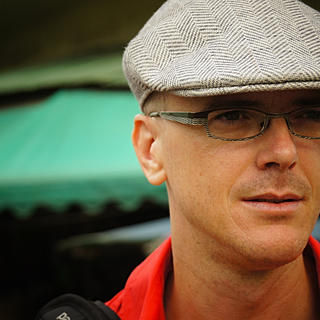How I learned English watching TV
- Mahigan Lepage
- 13 oct. 2011
- 2 min de lecture
Hearing English words at the border of sleep and dreams
A short story in English. Thanks to Rachel Price, who helped me correcting it.
------
When I was a little child, television played a enormous role in our lives, as in most families at the time. (I’m preparing a project about our relationship to TV right now, just as it’s starting to be swallowed up by the Internet).
My first memory of television is a vague one. I’m sitting on the floor and watching big blue and white characters moving in front of me, across a surface that seems as big as a movie screen. It was one of those TV with legs resting directly on the floor, and the TV program was the Smurfs...
This is not the place to recount all my childhood memories related to TV : rituals, nightmares, somnambulism, etc. I just want to talk about the way I «learned» (or began to learn) English through television.
As a child, I’d always wake up very early in the morning, as early as five o’clock. My parents didn’t want to be woken up that soon, so they taught me – I probably was 4 or 5 at that time – how to turn on the television and watch cartoons. Fortunately (for them!), we lived in the far-eastern part of Quebec Province, very close to New-Brunswick. And it happens that the time zone is different there : when it’s 5 in Quebec, it’s already 6 in NB. That means that the programs in English started at least one hour before the programs in French.
So I’d slip silently from my bedroom to the living room, turn on the TV, and watch the English programs until my parents or my sister would wake up, generally one hour later. I especially remember the program called The Wizard of Oz, a trivial adaptation of the famous tale. It was perfect for my age and my (very low) level of English proficiency. Everything was very simple and visual, and there were only a few words to understand.
My parents encouraged me to watch TV programs in English. My mother would often plant me down in front of Sesame Street. I didn’t like it that much though. The reality presented (black children, garbage cans, playing in the backstreets) was urban, very far from my rural reality. Every time I think about Sesame Street, I remember the time I felt asleep in the middle of the program. When I woke up, I was standing up in front of my mother and sister, who were looking at me strangely. I had been sleepwalking, going from one place to the other in the house, and talking nonsense. I used to sleepwalk very often when I was a child, and every time I’d wake up, I’d feel ashamed, and the others would not understand.
Anyway, this is how I learned the first rudiments of English, sometimes very early in the morning, sometimes during the day, but always at risk of falling asleep and sleepwalking. This is probably how, at the border of sleep and dreams, English entered my subconscious. In any case, when, as an adolescent, I first had to use English, it came to me – as faltering as it was – naturally, as an old forgotten language reappearing from my childhood.

Commentaires